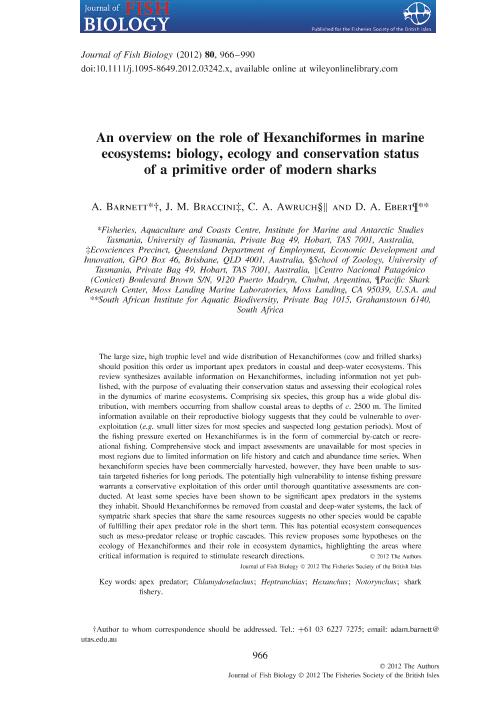Mostrar el registro sencillo del ítem
dc.contributor.author
Barnett, A.
dc.contributor.author
Braccini M,
dc.contributor.author
Awruch, Cynthia Andrea

dc.contributor.author
Ebert, D. A.
dc.date.available
2019-05-20T18:26:39Z
dc.date.issued
2012-04
dc.identifier.citation
Barnett, A.; Braccini M,; Awruch, Cynthia Andrea; Ebert, D. A.; An overview on the role of Hexanchiformes in marine ecosystems: Biology, ecology and conservation status of a primitive order of modern sharks; Wiley Blackwell Publishing, Inc; Journal of Fish Biology; 80; 5; 4-2012; 966-990
dc.identifier.issn
0022-1112
dc.identifier.uri
http://hdl.handle.net/11336/76728
dc.description.abstract
The large size, high trophic level and wide distribution of Hexanchiformes (cow and frilled sharks) should position this order as important apex predators in coastal and deep-water ecosystems. This review synthesizes available information on Hexanchiformes, including information not yet published, with the purpose of evaluating their conservation status and assessing their ecological roles in the dynamics of marine ecosystems. Comprising six species, this group has a wide global distribution, with members occurring from shallow coastal areas to depths of c. 2500 m. The limited information available on their reproductive biology suggests that they could be vulnerable to overexploitation (e.g. small litter sizes for most species and suspected long gestation periods). Most of the fishing pressure exerted on Hexanchiformes is in the form of commercial by-catch or recreational fishing. Comprehensive stock and impact assessments are unavailable for most species in most regions due to limited information on life history and catch and abundance time series. When hexanchiform species have been commercially harvested, however, they have been unable to sustain targeted fisheries for long periods. The potentially high vulnerability to intense fishing pressure warrants a conservative exploitation of this order until thorough quantitative assessments are conducted. At least some species have been shown to be significant apex predators in the systems they inhabit. Should Hexanchiformes be removed from coastal and deep-water systems, the lack of sympatric shark species that share the same resources suggests no other species would be capable of fulfilling their apex predator role in the short term. This has potential ecosystem consequences such as meso-predator release or trophic cascades. This review proposes some hypotheses on the ecology of Hexanchiformes and their role in ecosystem dynamics, highlighting the areas where critical information is required to stimulate research directions.
dc.format
application/pdf
dc.language.iso
eng
dc.publisher
Wiley Blackwell Publishing, Inc

dc.rights
info:eu-repo/semantics/openAccess
dc.rights.uri
https://creativecommons.org/licenses/by-nc-sa/2.5/ar/
dc.subject
Apex Predator
dc.subject
Chlamydoselachus
dc.subject
Heptranchias
dc.subject
Hexanchus
dc.subject
Notorynchus
dc.subject
Shark Fishery
dc.subject.classification
Otras Ciencias Biológicas

dc.subject.classification
Ciencias Biológicas

dc.subject.classification
CIENCIAS NATURALES Y EXACTAS

dc.title
An overview on the role of Hexanchiformes in marine ecosystems: Biology, ecology and conservation status of a primitive order of modern sharks
dc.type
info:eu-repo/semantics/article
dc.type
info:ar-repo/semantics/artículo
dc.type
info:eu-repo/semantics/publishedVersion
dc.date.updated
2019-03-08T16:43:35Z
dc.identifier.eissn
1095-8649
dc.journal.volume
80
dc.journal.number
5
dc.journal.pagination
966-990
dc.journal.pais
Reino Unido

dc.journal.ciudad
Londres
dc.description.fil
Fil: Barnett, A.. University of Tasmania; Australia
dc.description.fil
Fil: Braccini M,. Queensland Government; Australia
dc.description.fil
Fil: Awruch, Cynthia Andrea. Consejo Nacional de Investigaciones Científicas y Técnicas. Centro Nacional Patagónico; Argentina. University of Tasmania; Australia
dc.description.fil
Fil: Ebert, D. A.. Moss Landing Marine Laboratories; Estados Unidos. South African Institute For Aquatic Biodiversity; Sudáfrica
dc.journal.title
Journal of Fish Biology

dc.relation.alternativeid
info:eu-repo/semantics/altIdentifier/doi/http://dx.doi.org/10.1111/j.1095-8649.2012.03242.x
dc.relation.alternativeid
info:eu-repo/semantics/altIdentifier/url/https://onlinelibrary.wiley.com/doi/abs/10.1111/j.1095-8649.2012.03242.x
Archivos asociados
